|
Di seguito gli interventi pubblicati in questa sezione, in ordine cronologico.
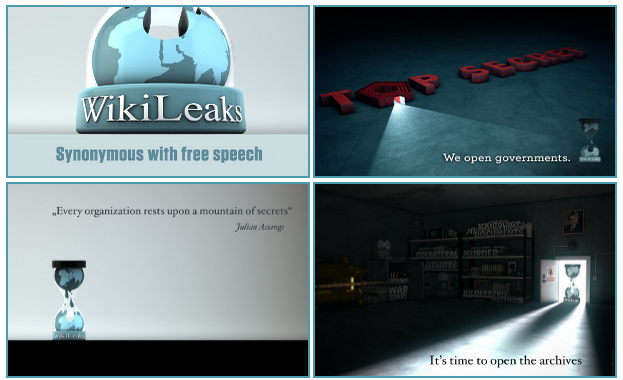
Yesterday, in the Westminster Magistrates Court in London, the lawyers for WikiLeaks co-founder Julian Assange presented to the judge a document from me stating that I have put up $20,000 of my own money to help bail Mr. Assange out of jail.
Furthermore, I am publicly offering the assistance of my website, my servers, my domain names and anything else I can do to keep WikiLeaks alive and thriving as it continues its work to expose the crimes that were concocted in secret and carried out in our name and with our tax dollars.
We were taken to war in Iraq on a lie. Hundreds of thousands are now dead. Just imagine if the men who planned this war crime back in 2002 had had a WikiLeaks to deal with. They might not have been able to pull it off. The only reason they thought they could get away with it was because they had a guaranteed cloak of secrecy. That guarantee has now been ripped from them, and I hope they are never able to operate in secret again.
So why is WikiLeaks, after performing such an important public service, under such vicious attack? Because they have outed and embarrassed those who have covered up the truth. The assault on them has been over the top:
- Sen. Joe Lieberman says WikiLeaks "has violated the Espionage Act."
- The New Yorker's George Packer calls Assange "super-secretive, thin-skinned, [and] megalomaniacal."
- Sarah Palin claims he's "an anti-American operative with blood on his hands" whom we should pursue "with the same urgency we pursue al Qaeda and Taliban leaders."
- Democrat Bob Beckel (Walter Mondale's 1984 campaign manager) said about Assange on Fox: "A dead man can't leak stuff ... there's only one way to do it: illegally shoot the son of a bitch."
- Republican Mary Matalin says "he's a psychopath, a sociopath ... He's a terrorist."
- Rep. Peter A. King calls WikiLeaks a "terrorist organization."
And indeed they are! They exist to terrorize the liars and warmongers who have brought ruin to our nation and to others. Perhaps the next war won't be so easy because the tables have been turned -- and now it's Big Brother who's being watched ... by us!
WikiLeaks deserves our thanks for shining a huge spotlight on all this. But some in the corporate-owned press have dismissed the importance of WikiLeaks ("they've released little that's new!") or have painted them as simple anarchists ("WikiLeaks just releases everything without any editorial control!"). WikiLeaks exists, in part, because the mainstream media has failed to live up to its responsibility. The corporate owners have decimated newsrooms, making it impossible for good journalists to do their job. There's no time or money anymore for investigative journalism. Simply put, investors don't want those stories exposed. They like their secrets kept ... as secrets.
I ask you to imagine how much different our world would be if WikiLeaks had existed 10 years ago. Take a look at this photo. That's Mr. Bush about to be handed a "secret" document on August 6th, 2001. Its heading read: "Bin Ladin Determined To Strike in US." And on those pages it said the FBI had discovered "patterns of suspicious activity in this country consistent with preparations for hijackings." Mr. Bush decided to ignore it and went fishing for the next four weeks.
But if that document had been leaked, how would you or I have reacted? What would Congress or the FAA have done? Was there not a greater chance that someone, somewhere would have done something if all of us knew about bin Laden's impending attack using hijacked planes?
But back then only a few people had access to that document. Because the secret was kept, a flight school instructor in San Diego who noticed that two Saudi students took no interest in takeoffs or landings, did nothing. Had he read about the bin Laden threat in the paper, might he have called the FBI? (Please read this essay by former FBI Agent Coleen Rowley, Time's 2002 co-Person of the Year, about her belief that had WikiLeaks been around in 2001, 9/11 might have been prevented.)
Or what if the public in 2003 had been able to read "secret" memos from Dick Cheney as he pressured the CIA to give him the "facts" he wanted in order to build his false case for war? If a WikiLeaks had revealed at that time that there were, in fact, no weapons of mass destruction, do you think that the war would have been launched -- or rather, wouldn't there have been calls for Cheney's arrest?
Openness, transparency -- these are among the few weapons the citizenry has to protect itself from the powerful and the corrupt. What if within days of August 4th, 1964 -- after the Pentagon had made up the lie that our ship was attacked by the North Vietnamese in the Gulf of Tonkin -- there had been a WikiLeaks to tell the American people that the whole thing was made up? I guess 58,000 of our soldiers (and 2 million Vietnamese) might be alive today.
Instead, secrets killed them.
For those of you who think it's wrong to support Julian Assange because of the sexual assault allegations he's being held for, all I ask is that you not be naive about how the government works when it decides to go after its prey. Please -- never, ever believe the "official story." And regardless of Assange's guilt or innocence (see the strange nature of the allegations here), this man has the right to have bail posted and to defend himself. I have joined with filmmakers Ken Loach and John Pilger and writer Jemima Khan in putting up the bail money -- and we hope the judge will accept this and grant his release today.
Might WikiLeaks cause some unintended harm to diplomatic negotiations and U.S. interests around the world? Perhaps. But that's the price you pay when you and your government take us into a war based on a lie. Your punishment for misbehaving is that someone has to turn on all the lights in the room so that we can see what you're up to. You simply can't be trusted. So every cable, every email you write is now fair game. Sorry, but you brought this upon yourself. No one can hide from the truth now. No one can plot the next Big Lie if they know that they might be exposed.
And that is the best thing that WikiLeaks has done. WikiLeaks, God bless them, will save lives as a result of their actions. And any of you who join me in supporting them are committing a true act of patriotism. Period.
I stand today in absentia with Julian Assange in London and I ask the judge to grant him his release. I am willing to guarantee his return to court with the bail money I have wired to said court. I will not allow this injustice to continue unchallenged.
P.S. You can read the statement I filed today in the London court here.
Source: huffingtonpost.com
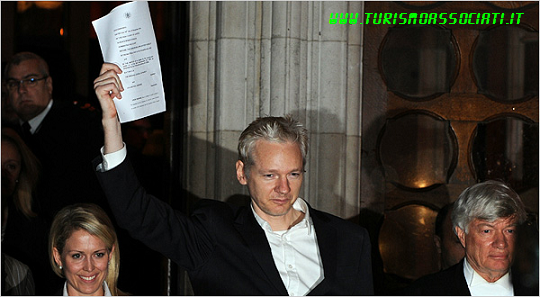
Ben Stansall/Agence France-Presse — Getty Images - The WikiLeaks founder Julian Assange was released on bail on Thursday by the High Court in London.
Following the Crown Prosecution Service's decision to appeal the bail granted on Tuesday by the Westminster Magistrates' Court, another hearing will take place today at 11:30 GMT at the High Court.
Peter Alexander of NBC News noted on Twitter that "Assange lawyer says defense has collected $315K bail. He's free if appeal's denied." The court had requested on Tuesday that the full bail amount be presented in cash.
Journalists present at the court, including a team from The Guardian, report that Julian Assange and his legal team have already arrived at the court for the hearing, which is expected to take two hours. It is unclear at this point whether live updates via Twitter will be allowed from the courtroom, as was the case at Tuesday's hearing.
In the meantime, please don't miss Peter Kemp's continued legal analysis of the bail and extradition arguments: Extradition Part 2--Bail, and Bail Arguments and the Appeal.
Update 1: Justice Ouseley has ruled that no Twitter updates will be allowed from the courtroom today, reports The Guardian's Luke Harding.
Update 2: The Guardian's Luke Harding quoted Justice Ouseley as saying, "The history of the way it [the case] has been dealt with by the Swedish prosecutors would give Mr Assange some basis that he might be acquitted following a trial." According to Mr Harding, "the case is looking good" for Julian Assange.
Update 3: The prosecution's appeal has been denied, reports Channel 4. Julian Assange has been granted bail, on slightly modified conditions compared to those specified at Tuesday's hearing, namely additional sureties, reports Guy Rundle for Crikey.
The next extradition hearing will take place on January 11.
According to testimony at Tuesday's hearing, Julian Assange will stay at the estate of Captain Vaughan Smith, founder of the Frontline Club. You can read Mr Smith's exclusive piece in yesterday's Independent, explaining his support for Julian Assange and WikiLeaks, concluding: "If to fight for this country we will have to fight for its fundamental principles of justice then I declare my position in the ranks."
Update 4: Guy Rundle reports that hearing costs have been awarded against the Crown Prosecution Service.
Update 5: After the formalities were completed, Julian Assange was released today at 6pm London time. He gave a short speech on the steps of the High Court, thanking supporters, his lawyers, members of the press "who were not all taken in," and the British justice system. He called on people to support those facing conditions harder than he did in prison, and promised to continue his work and reveal the evidence behind the allegations.
A video of the statement is available via the New York Times.
“They weren’t bad people. They let me eat, they let me sleep, they gave me my life”
— A hostage from Flight 847
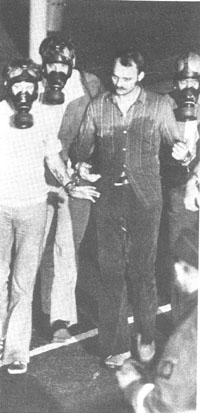 One way of describing this site would be “strange beliefs people have and how they got them.” A curious footnote that doesn’t seem to fit in nicely on any of the other pages is a phenomenon known as the Stockholm Syndrome. One way of describing this site would be “strange beliefs people have and how they got them.” A curious footnote that doesn’t seem to fit in nicely on any of the other pages is a phenomenon known as the Stockholm Syndrome.
In the summer of 1973, four hostages were taken in a botched bank robbery at Kreditbanken in Stockholm, Sweden. At the end of their captivity, six days later, they actively resisted rescue. They refused to testify against their captors, raised money for their legal defense, and according to some reports one of the hostages eventually became engaged to one of her jailed captors.
This struck some folks as weird, and as a way of coping with this uneasiness, as they started seeing more examples they named this class of strange behavior the “Stockholm Syndrome.”
Notorious in the United States is the case of Patty Hearst, who after being kidnapped and tortured by the Symbionese Liberation Army, took up arms and joined their cause, taking on the nom de guerre of “Tania” and helping the SLA rob banks.
The Stockholm Syndrome comes into play when a captive cannot escape and is isolated and threatened with death, but is shown token acts of kindness by the captor. It typically takes about three or four days for the psychological shift to take hold.
A strategy of trying to keep your captor happy in order to stay alive becomes an obsessive identification with the likes and dislikes of the captor which has the result of warping your own psyche in such a way that you come to sympathize with your tormenter!
The syndrome explains what happens in hostage-taking situations, but can also be used to understand the behavior of battered spouses, members of religious cults, Holocaust victims, household pets, and perhaps even users of Internet Explorer. I think it may also help explain the popularity of government and of the mass institutionalization of young people.
A reader responds...
Upon reviewing the actual events, it seems that much of the confusion centers around Clark Olafsson’s involvement. What really happened? A mentally disturbed individual (Olsson) tries to hold-up a bank, fails, and ends up taking four hostages. Olsson then tells the police that he wants his friend (Olafsson) to join him, and so, in the interest of a peaceful resolution, Clark agrees to become the second “captor.”
The original supposed victim of “Stockholm Syndrome” is Kristin Ehnemark, who appears to have kept her head while managing, with Olafsson’s assistance, to keep Olsson and an army of trigger-happy police from an all-out fire fight.
Here lies the source of the “syndrome.” Olafsson was initially arrested and convicted. Ehnemark was said to be mentally disturbed for trying to defend him. The idea that two calm, unarmed people were more effective than a highly trained and lethally outfitted police force was intolerable to 1970’s sensibilities.
Many people still have the event hopelessly confused with the terrorist kidnappings of the 1972 Munich Olympics (source of the misnomer, “Helsinki Syndrome”). The botched bank robbery is simply too mundane to be the source of such an exotic explanation, which really seems to have been more of an attack on the idea of peaceful resolution tactics, particularly when applied to mentally disturbed perpetrators (as if murderers, rapists and armed robbers were not severely dysfunctional).
As to whether Stockholm Syndrome applies to customers of abusive service providers (Microsoft, AOL, Blockbuster Video, etc.), I think this is much more akin to the behavior of a battered spouse. In order to justfy bad choices, people will often rationalize and defend their tormentors, even to the extent of projecting the same aspects onto other people’s spouses and providers: “Her husband really is mean to her, and her Mac crashes just as often as my PC.”
I have noticed that people usually love their new cars for at least a year, no matter what kind of lemon they’ve bought: “Yeah, my Saturn’s been in the shop a few times, but I still believe in the concept. By the way, have you seen my new Gateway PC?”
— MC
Source: sniggle.net
WikiLeaker Julian Assange celebrated his first day out on bail yesterday by vowing to keep spilling secrets like a sieve -- including insider information on banks around the world.

Assange also estimated there is an "80 percent" chance he'll be extradited to the United States to face espionage charges.
The Internet tattler, who is staying in a 10-bedroom mansion under house arrest for the next two months, boasted that he was ready to dump tens of thousands of additional documents that could "take down a bank or two."
"We have been attacked, primarily not by government . . . although things are heating up now, but by banks," he said.
"Banks from Dubai, banks from Switzerland, banks from the US, banks from the UK, so, yes of course, we are continuing to release material about banks," he told CNBC.
Assange, who yesterday said the media attention he has been getting made him "feel like Paris Hilton," earlier hinted that Bank of America would be a target.
While Assange believes he will be indicted in the United States, he insisted he couldn't be convicted of conspiring to steal diplomatic cables because he doesn't know who gave them to his group.
"Our technology means we don't know who is submitting us material," he told Katie Couric on the CBS Evening News.
Assange is charged with sexual assault in Sweden. He claims Swedish investigators have evidence that would exonerate him of charges he sexually attacked two women.
Source: nypost.com
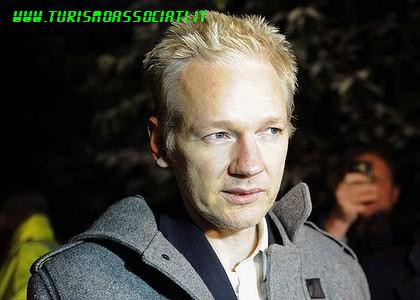
WikiLeaks founder Julian Assange speaks to the media outside Ellingham Hall in Norfolk, England, the home of his friend, journalist Vaughan Smith. Photo: Reuters
WIKILEAKS founder Julian Assange says he fears the United States is getting ready to indict him, but insists the secret-spilling website will continue its work, despite what he has called a ''dirty tricks campaign''.
Mr Assange spoke on Friday from snowbound Ellingham Hall, a supporter's 10-bedroom country mansion close to the city of Norwich, about three hours' drive from London, where he is confined on bail as he fights Sweden's attempt to extradite him on allegations of rape and molestation.
Mr Assange insisted to television interviewers that he was being subjected to a smear campaign and ''what appears to be a secret grand jury investigation against me or our organisation''.
He has retained the services of an unnamed US law firm.
Mr Assange has repeatedly voiced concerns that American authorities are getting ready to press charges over WikiLeaks's continuing release of about 250,000 secret State Department cables, which have angered and embarrassed US officials worldwide.
US officials are investigating WikiLeaks and considering charges against Mr Assange, a case that, if pursued, could end up pitting the government's efforts to protect sensitive information against press and speech freedoms guaranteed by the First Amendment.
A High Court judge freed Mr Assange on bail on Thursday on condition he live at the estate in eastern England, wear an electronic tag and report to police daily.
Mr Assange has described his bail conditions at the 18th-century mansion owned by former British Army officer Vaughan Smith as ''hi-tech house arrest''.
Although Mr Assange promised to focus on clearing his name, he said his first priority was to his work.
''Now that I am back to assist the directing of our ship, our work will proceed in a faster manner,'' he told the BBC.
Source: The Sydney Morning Herald
It has come to my attention that various mainstream news organizations are beginning to run an association between my 2007 performance piece/film, “Zeitgeist: The Movie” and the tragic murders conducted by an extremely troubled young man in Tucson, Arizona. They are also slowly beginning to bleed the obvious line between my 2007 documentary work, my film series as a whole and The Zeitgeist Movement, which I am the founder. Frankly, I find this isolating, growing association tremendously irresponsible on the part of ABC, NBC and their affiliates - further reflecting the disingenuous nature of the America Media Establishment today.

It appears to have begun with a comment on NBC news referencing my film along with other “influential” films as well, such as Richard Kelly's film “Donnie Darko” and then spreading to ABC News where it singled out Zeitgeist: The Movie and the Series itself, stating: “Osler pointed to an online documentary series called "Zeitgeist" as a possible influence on the man.
The series rails on currency-based economics.
"I really think that this 'Zeitgeist' documentary had a profound impact on Jared's mindset and how he viewed that world that he lives in," Osler said.”
abcnews.go.com/US/tucson-shooting-friend-jared-loughner-speaks-motive-alleged/story?id=12597092
When we reflect on the history of seeming random violence or other forms of highly offensive, irrational, aberrant behavior, we see a common pattern of reaction from the public and media in their attempt to explain such extreme acts. Rather than deeply examining the Bio-Psycho-Social nature of human social development and the vast spectrum of influences that create and morph each of us in unique and sometime detrimental ways, they take the easy way out. The first thing do it simply ignore all modern scientific social understandings of what generates human motivation in both positive and negative regard, for to do so can only call into question the social system itself and hence the “zeitgeist” (meaning: spirit/intellectual climate of the time/culture) at large.
Generally speaking, it is historically accurate to say that the Mainstream Media simply isn't in the business of challenging the Status Quo. The limits of debate are firmly set. Virtually all ideas, persons or groups who have succeeded in changing the world for the better, later to be hailed as heros in the public mind, started out being condemn by those in the Mainstream Media who latch on to the dominant world view of the time. Even Martin Luther King Jr., a peaceful, loving, wonder of a man who contributed more to our social progress than likely any humanitarian in the US history, was followed by the CIA and publicly humiliated as a “Communist” which he even had to defend in front of a Congressional Committee. In fact, you can rest assured that if King was alive in the current paradigm today and seeking an equal form of justice- he would be given the name: “Terrorist”.
So, again, rather than taking the scientific view, the Mainstream Media often seeks out or implies one point of blame and runs with it. After all, it is much easier, presentable and more simplistic for the public to think that the troubling reality of seemingly random acts of mass murder is the result of a “singular influence” and hence the logic goes that if that one influence is removed, then the world will be back in balance. This gives the public a false resolve and position of focus in an otherwise ambiguous, complex world of social and biologic influences. And as far as the scapegoat itself, very often any group, media or dataset that is counter-culture or even hints at wishing to challenge the status quo, is a magnet for such blame.
For example, musical groups of a counter-culture nature have been a favorite scapegoat for acts of murder/violence historically. In 1990, the rock band Judas Priest was actually taken to court for their “role” in the self-inflicted gunshot wounds in 1985 of 20-year old James Vance and 18-year old Raymond Belknap in Reno, Nevada. In 2008, the band Slipknot was publicly tied/blamed to a high-school murder in South Africa. Even the Beatles song “Helter-skelter” was associated to the murders incited by Charles Manson. It goes on and on... and, frankly, it's simply pathetic - avoiding the true nature of the problem- which is the Socio-Economic Environment itself.
Make no mistake: The Social System is to blame for the rampage of Jared Loughner – not some famous online documentary which is known as the most viewed documentary of all time in internet history. Are the other 200 million people who have seen the film also preparing for murder sprees? I think not.
In my new film: Zeitgeist: Moving Forward, I feature a prominent Harvard Criminal Psychologist by the name of Dr. James Gilligan who headed the Centre for the Study of Violence at Harvard Medical School for many years. In his life work of personally engaging with the most dangerous, violent offenders the US system produces, he found some basic trends. The most common is the social issue of “shame”. Our socio-economic system inherently breeds social division and there is a natural demeaning of others generated as a result. It is a scientific fact that mass murderers and those who many just dismiss as “evil” today, are the product of years of being shamed, humiliated and demeaned. Their acts of violence is a reaction from these highly oppressive feelings and the real resolve to such acts can only come from removing the real source of such emotional hurt. You will notice that most other countries don't come close to the level of violence we see in the United States. The US is the capital of violence with 30-300 times more acts of violence than any other country. Why? We have produced more serial killers in America than all other countries combined. You will notice the Mainstream never asks this question.
If anyone would like to understand why more and more people in the modern world end up like Jared Loughner and why these patterns are only going to get worse as time goes in this system, I suggest the book “Violence” by Harvard Criminal Psychologist Dr. Gilligan.
In conclusion, let it be stated that the Zeitgeist Film Series is about critical thought regarding various social issues which challenge many erroneous notions held as fact in the modern culture. It also explicitly promotes non-violence, human unity and prosperous human development based on truth and science.
Anyone who wishes to really understand the works can view them for free online at zeitgeistmovie.com and my new film, which will detail how a new, humane social system can work, will be 315 theaters in 60 countries and 30 language starting Jan 15th 2011. www.zeitgeistmovingforward.com
Author: Peter Joseph

Friends,
Those that have listened to my radio shows might have remembered me commenting many times on the fact that when it came to attacks we have experienced in the past: "we haven't seen anything yet".
The bored, petty bloggers and various hatefilled individuals who have wasted their time creating anti-z/anti-peter joseph sites and videos are about to be royally trumped by a mainstream media onslaught that will bring the definition of attack/propaganda into a whole new light.
I have been contacted by CNN, NBC, FOX, ABC, AP, Yahoo! and many national/local/international news agencies regarding the comment by Zack Osler referencing a TWO YEAR OLD association of my first film and Jared Loughner. The parroting of this painfully unscientific and idiotic association has resonated across all mainstream outlets. As of now, I am not engaging them for I want the new film to be released before anything.
After the film is released, I have a feeling we are going to see a huge backlash. The stage has been set... and I want all members to hold strong. Don't let any of this get to you. This is exactly what I have been expecting with regard to the media introduction of TZM and it is long overdue. If it wasn't the AZ shootings it would have been another scapegoat. Just as Wikileaks is now associated with a "rapist"- the Z films and hence the Movement/myself are going to be publicly pegged to "mass murder". This is how the game works and I plan to do a radio show on the history of propaganda in the near future to discuss this historical phenomenon.
After the release, I am going to established a large PR campaign for all press interactions from the Movement and TZM is going to explode with interest.
"First they ignore you, then they ridicule you, then they fight you, then you win."
-- Mahatma Gandhi
These days, when we think of George W. Bush, we think mostly of what a horrible mess he made of the economy. But his even more tragic legacy is the loss of our moral authority, and the transformation of the United States of America from global champion of human rights into an outlaw nation.
History is likely to judge Bush most harshly for two things in particular: Launching a war against a country that had not attacked us, and approving the use of cruel and inhumane interrogation techniques.
And that's why the two most essential lies -- among the many -- in his new memoir are that he had a legitimate reason to invade Iraq, and that he had a legitimate reason to torture detainees.
Neither is remotely true. But Bush must figure that if he keeps making the case for himself -- particularly if it goes largely unrebutted by the traditional media, as it has thus far -- then perhaps he can blunt history's verdict.
It may even be working. Extrapolating from the response to the book, former vice president Dick Cheney on Tuesday told a crowd gathered for Bush's presidential library groundbreaking in Dallas that "judgments are a little more measured than they were" and that "history is coming around."
The 'Decision' to Go to War
In "Decision Points," Bush describes the invasion of Iraq as something he came to support only reluctantly and after a long period of reflection. This is a flat-out lie. Anyone who paid any attention to the news at the time knew Bush was dead-set on war long before he sent in the troops in March 2003. And there is now an abundant amount of documentation, in the form of leaks, unclassified memos, witness interviews and other people's memoirs to prove it.
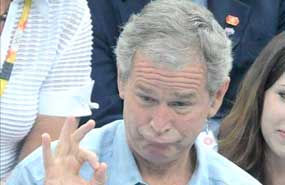
The historical record clearly shows that Bush had long harbored a desire to strike out at Saddam Hussein, was trying to link Iraq to 9/11 within a day of the terrorist attacks, and finally found the excuse he was looking for in skewed intelligence about alleged Iraqi weapons of mass destruction.
The only real question is whether he actively deceived the American public and the world -- or whether he was so passionate about selling the public on the war that he intentionally blinded himself to how brazenly Vice President Cheney had politicized and abused the intelligence process.
* * * * * * * * * * * * * * * * * * * * * * * * * * * * * * * *
Bush repeatedly insists in his memoir that he tried to avoid war. He describes his preferred approach to Iraq as "coercive diplomacy" and tries to explain away the military planning, the troop movements and the constant saber-rattling as being intended primarily to scare Saddam into "disarming". He even tries to retroactively justify one of his notoriously long vacations by suggesting that he needed the time to think. "I spent much of August 2002 in Crawford, a good place to reflect on the next decision I faced: how to move forward on the diplomatic track," he writes.
In an interview with NBC's Matt Lauer aired on Nov. 8, Bush declared, "I gave diplomacy every chance to work." But as David Corn put it ever so succinctly on Politics Daily, that is a "super-sized whopper." U.N. weapons inspectors had found nothing and were getting more cooperation from the Iraqi government just prior to the invasion. And Corn offered up one particularly telling anecdote from the book he co-authored, "Hubris: The Inside Story of Spin, Scandal, and the Selling of the Iraq War": On May 1, 2002 -- almost a year prior to the invasion -- Bush told press secretary Ari Fleischer of Saddam, "I'm going to kick his sorry motherfucking ass all over the Mideast."
Bush writes in his memoir that the idea of attacking Iraq came up at a meeting of his national security team at Camp David, four days after the 9/11 attacks. By his account, it was then Deputy Defense Secretary Paul Wolfowitz who "suggested that we consider confronting Iraq as well as the Taliban." Bush writes that he eventually decided that "[u]nless I received definitive evidence tying Saddam Hussein to the 9/11 plot I would work to resolve the Iraq problem diplomatically."
But that's a hugely disingenuous version of events. It didn't take Wolfowitz and four days after 9/11 for the idea of attacking Iraq to occur to Bush. As the 9/11 Commission report documented: "President Bush had wondered immediately after the attack whether Saddam Hussein's regime might have had a hand in it."
TO BE CONTINUED ...

Mr Hu also said China was taking steps to replace it with the yuan, its own currency, but acknowledged that would be a "fairly long process".
The remarks to two US newspapers come ahead of a state visit by the Chinese leader to Washington this week.
They reflect continuing tensions over currency issues between the two powers.

The remarks to the Washington Post and Wall Street Journal came in the form of written responses to questions. Mr Hu also reiterated criticism of a decision by the US Federal Reserve to inject $600bn into the economy, which some argue will weaken the dollar at the expense of other countries' exports.
"The monetary policy of the United States has a major impact on global liquidity and capital flows and therefore, the liquidity of the US dollar should be kept at a reasonable and stable level," President Hu said.
'Important contribution'
Meanwhile, he disagreed with suggestions that letting the yuan appreciate in value would help China to combat inflation.
He said inflation, which reached 5.1% in November - its highest level in 28 months - was "on the whole moderate and controllable".
"We have the confidence, conditions and ability to stabilise the overall price level," he said.
Beijing has previously come under pressure over its currency from the US, which has accused China of manipulating the yuan to help boost Chinese exports.
On Sunday night, three Democratic senators announced they would introduce a new bill to increase penalties the US considers to be "currency manipulators".
However, the move is unlikely to receive support from senior Republicans - who recently took control of the House of Representatives.
The new House speaker, John Boehner, voted against another bill that failed last year that would have helped US companies challenge currency subsidies.
Currency reservations
Despite criticism of the current system, Mr Hu said he believed it would be a long time before the yuan - or renminbi (RMB) - was accepted as a global currency.
"China has made important contribution to the world economy in terms of total economic output and trade, and the RMB has played a role in the world economic development," he said.
"But making the RMB an international currency will be a fairly long process."
Some economists suggest that China's growth strategy - with its focus on exports and state-led investment - may be incompatible with Mr Hu's currency ambitions.
In order for the yuan to oust the dollar as a global reserve currency, international central banks and investors would need to be able to get their hands on huge amounts of the currency.
Yet neither of the ways in which China could supply the world with more yuan is at all appealing to Beijing, according to Michael Pettis, economist at Beijing University.
He says the country could start running big trade deficits with the rest of the world - just as the US has been doing - and finance them by selling their currency to their trade partners.
Or it could allow foreign investors to pour their money into Chinese financial assets - like shares, bonds or yuan bank accounts - matched by similar Chinese investments in the rest of the world.
But Mr Pettis warns that for the numbers to add up, China would need to do these things on an unprecedented scale, which is likely to be unpalatable to the authorities.
Either of these moves is likely to go with an increase in the yuan's value, making Chinese exporters less competitive.
And they may also fuel speculative asset bubbles in China - something that Beijing has been trying to clamp down on of late.
Source: bbc.co.uk
... CONTINUES.
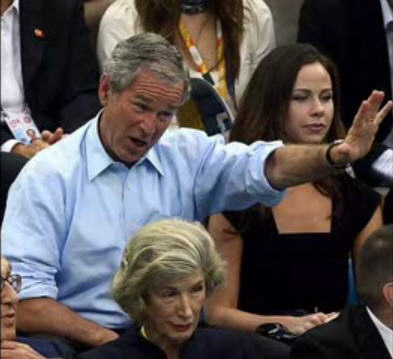
In the first tell-all book from inside Bush's national security team, Richard A. Clarke wrote in 2004of a meeting he had with Bush the day after 9/11:
The president in a very intimidating way left us, me and my staff, with the clear indication that he wanted us to come back with the word there was an Iraqi hand behind 9/11 because they had been planning to do something about Iraq from before the time they came into office....
I think they had a plan from day one they wanted to do something about Iraq. While the World Trade Center was still smoldering, while they were still digging bodies out, people in the White House were thinking: 'Ah! This gives us the opportunity we have been looking for to go after Iraq.'
Clarke notes that the following day, Defense Secretary Donald Rumsfeld complained in a meeting that there were no decent targets for bombing in Afghanistan and that the U.S. should consider bombing Iraq, which had better targets.
At first I thought Rumsfeld was joking. But he was serious and the President did not reject out of hand the idea of attacking Iraq. Instead, he noted that what we needed to do with Iraq was to change the government, not just hit it with more cruise missiles, as Rumsfeld had implied.
Just over two months later, on Nov. 21, 2001, Bush formally instructed Rumsfeld that he wanted to develop a plan for war in Iraq. Sixteen months after that, in March 2003, the invasion began.
* * * * * * * * * * * * * * * * * * * * * * * * * * * * * * * *
In the period during which Bush claims he was wringing his hands about whether or not to attack, he and his aides were instead intensely focused on building the public case for what was, in their minds, an inevitability.
The first concrete bits of evidence to that effect were the Downing Street Memos, first published in May 1, 2005, which documented the conclusions of British officials after high-level talks in Washington in July 2002:
Military action was now seen as inevitable. Bush wanted to remove Saddam, through military action, justified by the conjunction of terrorism and WMD. But the intelligence and facts were being fixed around the policy.
And just recently, the independent National Security Archives completed a major analysis of the historical record, including a new trove of formerly secret records of both the Bush administration and the British cabinet of Tony Blair. John Prados, co-director of the archives' Iraq Documentation Project, summed up their findings this way: "The more we learn about how the Iraq War began the worse the story gets."
Prados wrote that the cumulative record clearly "demonstrates that the Bush administration swiftly abandoned plans for diplomacy to curb fancied Iraqi adventurism by means of sanctions, never had a plan subsequent to that except for a military solution, and enmeshed British allies in a manipulation of public opinion on both sides of the Atlantic designed to generate support for a war."
That's right: There never was another plan. And therefore -- ironically enough, considering the title of Bush's book -- there never was an actual "decision point" either. There were some debates about how to invade Iraq, and when, but not if.
Prados writes:
In contrast to an extensive record of planning for actual military operations, there is no record that President George W. Bush ever made a considered decision for war. All of the numerous White House and Pentagon meetings concerned moving the project forward, not whether a march into conflict was a proper course for the United States and its allies. Deliberations were instrumental to furthering the war project, not considerations of the basic course.
Former CIA director George Tenet admitted as much in his own memoir, in 2007. "There was never a serious debate that I know of within the administration about the imminence of the Iraqi threat," he wrote, nor "was there ever a significant discussion" about the possibility of containing Iraq without an invasion.
TO BE CONTINUED...
... CONTINUES.
And in June 2008, Senate Intelligence Committee Chairman Jay Rockefeller described the conclusions of his committee's exhaustive report on the Bush administration's public statements regarding Iraq:
Before taking the country to war, this Administration owed it to the American people to give them a 100 percent accurate picture of the threat we faced. Unfortunately, our Committee has concluded that the Administration made significant claims that were not supported by the intelligence. In making the case for war, the Administration repeatedly presented intelligence as fact when in reality it was unsubstantiated, contradicted, or even non-existent. As a result, the American people were led to believe that the threat from Iraq was much greater than actually existed.
It is my belief that the Bush Administration was fixated on Iraq, and used the 9/11 attacks by al Qaeda as justification for overthrowing Saddam Hussein. To accomplish this, top Administration officials made repeated statements that falsely linked Iraq and al Qaeda as a single threat and insinuated that Iraq played a role in 9/11. Sadly, the Bush Administration led the nation into war under false pretenses.
There is no question we all relied on flawed intelligence. But, there is a fundamental difference between relying on incorrect intelligence and deliberately painting a picture to the American people that you know is not fully accurate.
It was, in short, a propaganda campaign. As former Press Secretary Scott McClellan wrote in hisrevelatory 2008 memoir, Bush's advisors "decided to pursue a political propaganda campaign to sell the war to the American people.... A pro-war campaign might have been more acceptable had it been accompanied by a high level of candor and honesty, but it was not."
And as Jonathan Landay wrote for Knight Ridder in 2005, the materials that had become public to date demonstrated "that the White House followed a pattern of using questionable intelligence, even documents that turned out to be forgeries, to support its case -- often leaking classified information to receptive journalists -- and dismissing information that undermined the case for war."
That's what made Patrick Fitzgerald's prosecution of the Valerie Plame case so essential. It promised a public view into the heart of the administration's dirty tricks department -- and a chance to find out once and for all who the mastermind was. But Cheney aide Scooter Libby's lies stymied Fitzgerald, and we never found out for sure -- even though the signs pointed pretty clearly to Libby's boss.
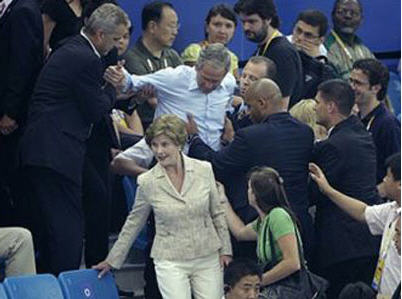
Even if Cheney was the driving force behind the war campaign's deceptions, however, Bush was undeniably the chief cheerleader.
* * * * * * * * * * * * * * * * * * * * * * * * * * * * * * * *
Precisely to what extent pressure from the White House was responsible for the intelligence community's totally inaccurate assessment of Iraq's WMDs remains unclear. Bush's own WMD commission, not surprisingly, gave him a pass in their final report. But there was no doubt the community knew what its chief customers wanted to hear, and gave it to them.
Even so, the intelligence did not support Bush's insistence at the time that those weapons posed an imminent threat.
Paul R. Pillar, the intelligence community's former senior analyst for the Middle East, wrote in 2006 that it was only through the overt, intentional misreading, cherry-picking and politicization of intelligence findings that the case could be made for war:
If the entire body of official intelligence analysis on Iraq had a policy implication, it was to avoid war - or, if war was going to be launched, to prepare for a messy aftermath. What is most remarkable about prewar US intelligence on Iraq is not that it got things wrong and thereby misled policymakers; it is that it played so small a role in one of the most important US policy decisions in recent decades.
Intelligence on Iraqi weapons programs did not drive Bush's decision to go to war, Pillar continued:
A view broadly held in the United States and even more so overseas was that deterrence of Iraq was working, that Saddam was being kept "in his box," and that the best way to deal with the weapons problem was through an aggressive inspections program to supplement the sanctions already in place. That the administration arrived at so different a policy solution indicates that its decision to topple Saddam was driven by other factors.
For Bush, the intelligence findings Cheney and others were feeding him -- and the media -- were not factors that needed to be weighed carefully as part of a decision-making process. There wasno decision-making process. The intelligence findings were simply elements of a sales campaign.
The one time Bush is recorded as having pushed back at the intelligence at all was in the famous late 2002 Oval Office scene with Tenet. However, contrary to popular mythology, Bush's concern was manifestly not about the intelligence itself, but about its marketing potential.
TO BE CONTINUED ...
|
|
Ci sono 2285 persone collegate
|
<
|
aprile 2024
|
>
|
L |
M |
M |
G |
V |
S |
D |
1 |
2 |
3 |
4 |
5 |
6 |
7 |
8 |
9 |
10 |
11 |
12 |
13 |
14 |
15 |
16 |
17 |
18 |
19 |
20 |
21 |
22 |
23 |
24 |
25 |
26 |
27 |
28 |
29 |
30 |
|
|
|
|
|
| |
|
|
|
|
|
|
18/04/2024 @ 06:27:26
script eseguito in 631 ms
|